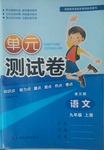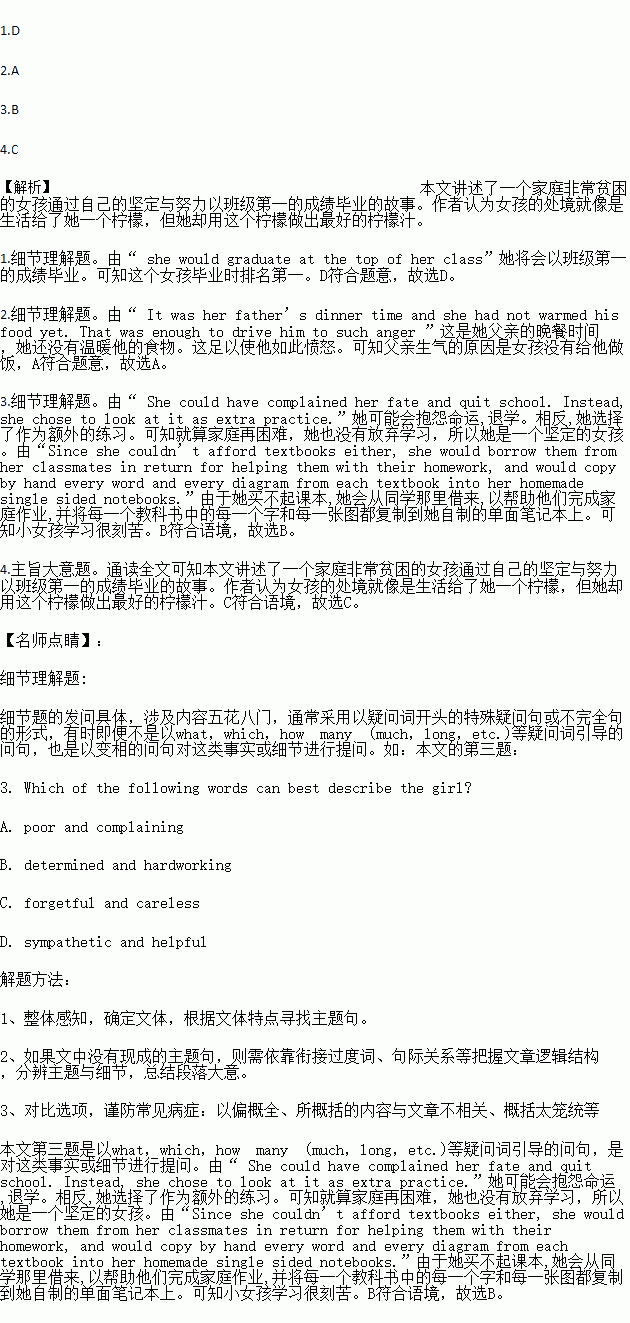题目内容
There was a young girl who was raised in circumstances where three meals day was a luxury.
Her family was so poor that she couldn’t afford footwear or books. She would wear overly long dresses to school so her class mates wouldn't notice her bare feet.
Her father had old fashioned ideas about how sons vs. daughters should be raised. However, a sympathetic colleague of his at work would sneak his daughter paper that was used only on one side. The girl would then sew them into a notebook and use those at school. Since she couldn’t afford textbooks either, she would borrow them from her classmates in return for helping them with their homework, and would copy by hand every word and every diagram from each textbook into her homemade single sided notebooks. She could have complained her fate and quit school. Instead, she chose to look at it as extra practice.
Invariably, she would graduate at the top of her class and eventually made it all the way to high school, fighting against her circumstances all the way, every single day.
It was the night before finals. She was putting the finishing touches on her biology lab work journal. It represented an entire year’s worth of her work. She was so absorbed in her school work she forgot to look at the clock. It was her father’s dinner time and she had not warmed his food yet. That was enough to drive him to such anger that he grabbed her journal and stuck the entire thing in the wood stove. Through blurry eyes, she watched her entire year’s labor go up in flames. In order to make that journal which had to be submitted to the examiners for grading, she had specially gathered sheets of paper with pencil writing on one side, and erased every pencil mark using erasers so small they were abandoned by their previous ow ners as unusable. She then measured and hand cut each sheet so they were all the exact same size before starting work on the journal of 100 pages.
ners as unusable. She then measured and hand cut each sheet so they were all the exact same size before starting work on the journal of 100 pages.
She could have broken down beyond hope at this point. Instead, when life handed her lemons, she decided she’s going to make the best lemonade ever tasted.
She served her father dinner, and after he went to bed, she set about recreating an entire year's worth of work overnight by the light of an oil lamp, because her father would be mad if she wasted electricity studying. This time, she was racing against the clock and this cost her when her work was graded. She still ended up topping her class anyway. She graduated high school with perfect scores and the highest honors in Math, Physics and Biology and with one point less than the perfect score in Chemistry. She made the best lemonade in her life!
1.Which of the following is TRUE?
A. The girl’s father treated her very well.
B. The girl stole paper from her colleague.
C. The girl complained her life and quit school.
D. The girl ranked No. 1 when she graduated.
2.Why her father was so angry?
A. The girl didn’t cook for him.
B. The girl didn’t do well at school.
C. The girl made the lemonade.
D. The girl wasted electricity studying.
3.Which of the following words can best describe the girl?
A. poor and complaining
B. determined and hardworking
C. forgetful and careless
D. sympathetic and helpful
4.What is the best title of this passage?
A. A Brave Young Girl.
B. Be Yourself.
C. The Best Lemonade in life.
D. Study is very important
 阳光试卷单元测试卷系列答案
阳光试卷单元测试卷系列答案

 y last August, Tim heard some shouting. Looking out to the sea carefully, he saw a couple of kids in a rowboat were being pulled out to sea.
y last August, Tim heard some shouting. Looking out to the sea carefully, he saw a couple of kids in a rowboat were being pulled out to sea. l.
l.